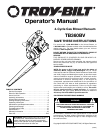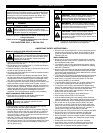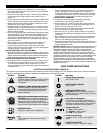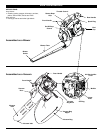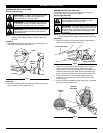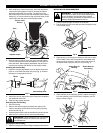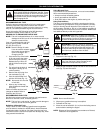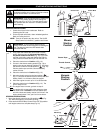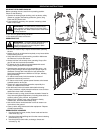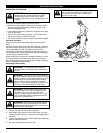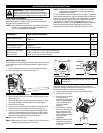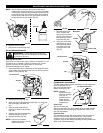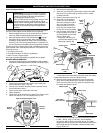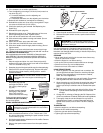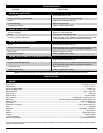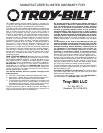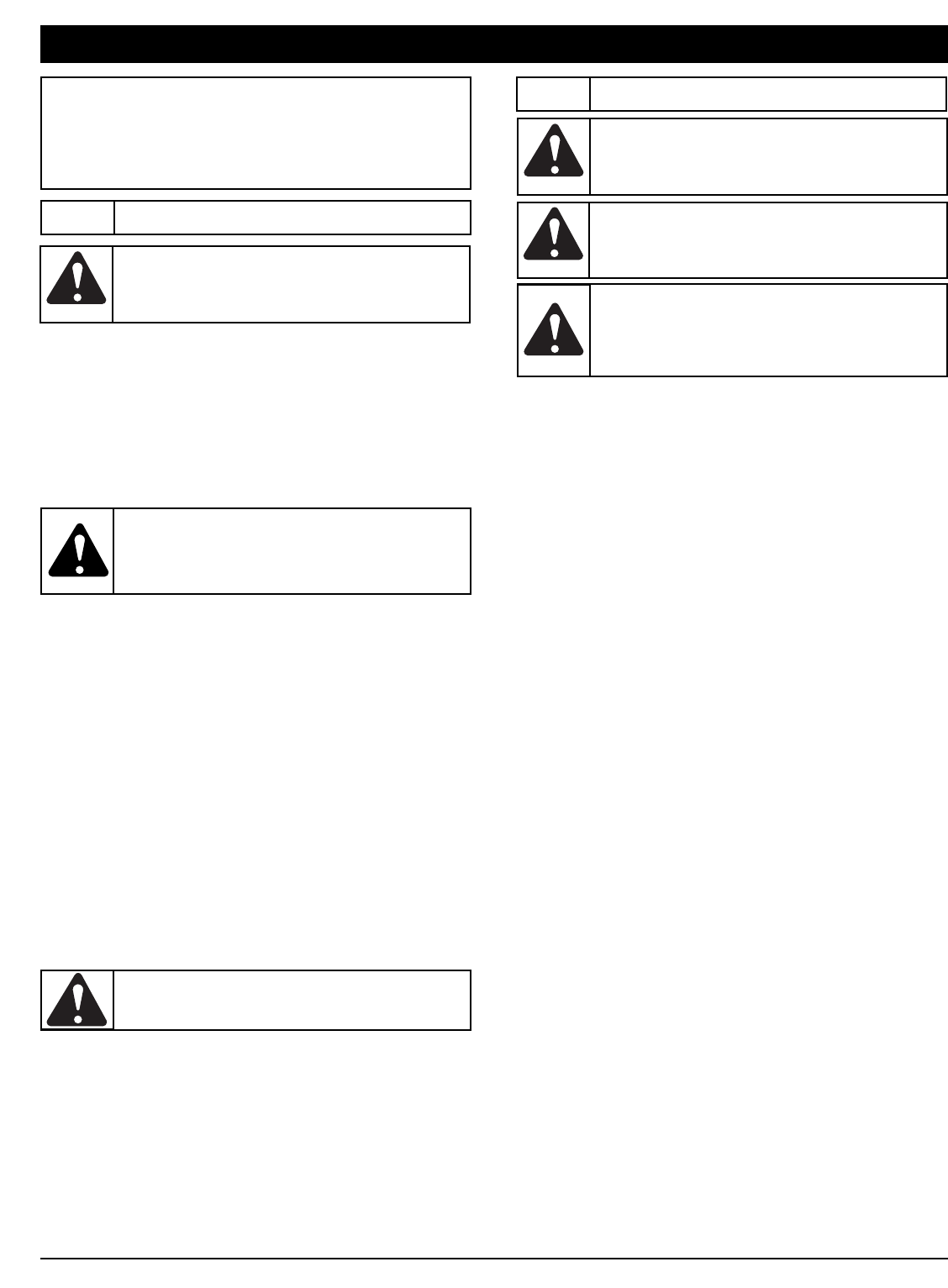
2
RULES FOR SAFE OPERATION
• IMPORTANT SAFETY INSTRUCTIONS •
READ ALL INSTRUCTIONS BEFORE OPERATING
• Read the instructions carefully. Be familiar with the controls
and proper use of the unit.
• Do not operate this unit when tired, ill, or under the influence
of alcohol, drugs, or medication.
• Children and teens under the age of 15 must not use the unit,
except for teens guided by an adult.
• All guards and safety attachments must be installed properly
before operating the unit.
• Inspect the unit before use. Replace damaged parts. Check
for fuel leaks. Make sure all fasteners are in place and secure.
Replace parts that are cracked, chipped, or damaged in any
way. Do not operate the unit with loose or damaged parts.
• Carefully inspect the area before starting the unit. Remove all
debris and hard or sharp objects such as glass, wire, etc.
• Clear the area of children, bystanders, and pets. At a minimum,
keep all children, bystanders, and pets outside a 50 feet (15 m.)
radius; there still may be a risk to bystanders from thrown
objects. Bystanders should be encouraged to wear eye
protection. If you are approached, stop the unit immediately.
SAFETY WARNINGS FOR GAS UNITS
• Store fuel only in containers specifically designed and
approved for the storage of such materials.
• Avoid creating a source of ignition for spilled fuel. Do not
start the engine until fuel vapors dissipate.
• Always stop the engine and allow it to cool before filling the
fuel tank. Never remove the cap of the fuel tank, or add fuel,
when the engine is hot. Never operate the unit without the
fuel cap securely in place. Loosen the fuel tank cap slowly to
relieve any pressure in the tank.
• Add fuel in a clean, well-ventilated outdoor area where there
are no sparks or flames. Slowly remove the fuel cap only
after stop-ping engine. Do not smoke while adding fuel. Wipe
up any spilled fuel from the unit immediately. Always wipe
unit dry before using.
• Move the unit at least 30 feet (9.1 m) from the fueling source
and site before starting the engine. Do not smoke or allow
sparks and open flames near the area while adding fuel or
operating the unit.
WHILE OPERATING
• Never start or run the unit inside a closed room or building.
Breathing exhaust fumes can kill. Operate this unit only in a
well-ventilated outdoor area.
• To reduce the risk of injury associated with thrown objects,
wear safety glasses or goggles that are marked as meeting
ANSI Z87. standards.
• Never run the unit without the the proper equipment attached.
When using this unit, always install the blower/vacuum tubes
and vacuum bag depending on model. Make sure the vacuum
bag is completely zipped closed.
• To reduce the risk of hearing loss associated with sound level(s),
always wear ear/hearing protection when operating this unit.
• Wear heavy, long pants, boots, and gloves. Do not wear
short pants, sandals, or go barefoot.
• To avoid static electricity shock, do not wear rubber gloves
or any other insulated gloves while operating this unit.
• To reduce the risk of injury associated with objects being
drawn into rotating parts, do not wear loose clothing, jewelry,
scarves, and the like. Secure hair above shoulder level.
• Wear a face or dust mask if the operation is dusty. Long
sleeve shirts are recommended.
• Use the unit only in daylight or good artificial light.
• Keep outside surfaces free from oil and fuel.
• Avoid accidental starting. Be in the starting position whenever
pulling the starter rope. The operator and unit must be in a stable
position while starting. Refer to Starting/Stopping Instructions.
• Do not set unit on any surface except a clean, hard area
while engine is running. Debris such as gravel, sand, dust,
grass, etc. could be picked up by the air intake and thrown
out by the discharge opening, damaging unit, property, or
causing serious injury to bystanders or operator.
• Use the right tool. Only use this tool for the purpose intended.
• Do not force unit. It will do the job better and with less
likelihood of injury at a rate for which it was designed.
• Do not overreach or use from unstable surfaces such as ladders,
trees, steep slopes, rooftops, etc. Always keep proper footing
and balance.
• Always hold the unit with a firm grip when operating.
• Keep hands, face, and feet at a distance from all moving
parts. Do not touch or try to stop the impeller when it is
rotating. Do not operate without guards in place.
WARNING: Gasoline is highly flammable, and
its vapors can explode if ignited. Take the
following precautions:
WARNING:
When using the unit, you must follow
the safety rules. Please read these instructions before
operating the unit in order to ensure the safety of the
operator and any bystanders. Please keep these
instructions for later use.
The purpose of safety symbols is to attract your attention to
possible dangers. The safety symbols, and their explanations,
deserve your careful attention and understanding. The safety
warnings do not by themselves eliminate any danger. The
instructions or warnings they give are not substitutes for
proper accident prevention measures.
NOTE: Advises you of information or instructions vital to the
operation or maintenance of the equipment.
SYMBOL MEANING
Read the Operator’s Manual(s) and follow all warnings and
safety instructions.
Failure to do so can result in serious injury to the operator
and/or bystanders.
FOR QUESTIONS, CALL 1-800-800-7310
SYMBOL MEANING
WARNING: Failure to obey a safety warning
can result in injury to yourself and others. Always
follow the safety precautions to reduce the risk of
fire, electric shock and personal injury.
CAUTION: Failure to obey a safety warning
may result in property damage or personal injury to
yourself or to others. Always follow the safety
precautions to reduce the risk of fire, electric shock
and personal injury.
DANGER: Failure to obey a safety warning will
result in serious injury to yourself or to others.
Always follow the safety precautions to reduce the
risk of fire, electric shock and personal injury.
SAFETY ALERT: Indicates danger, warning or
caution. Attention is required in order to avoid
serious personal injury. May be used in conjunction
with other symbols or pictographs.



